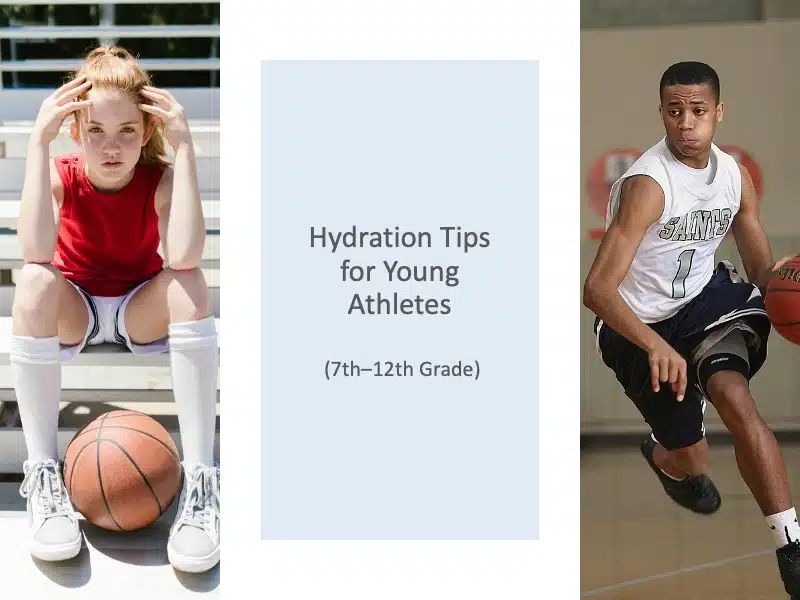Hydration Tips for Young Athletes (7th–12th Grade)
Amongst the most important nutrition tips for young athletes, hydration is one of the most critical yet often overlooked components.
As a professional basketball player with a master’s degree in nutrition education, I’ve witnessed firsthand the importance of hydration for athletes at all levels.
Research shows that even mild dehydration—just a 2% loss of body weight due to fluid loss—can significantly impact athletic skills, endurance, and mental focus (Baker et al., 2007).
Furthermore, extreme cases of dehydration or overhydration can lead to severe health consequences, including fainting, cramping, or even life-threatening conditions like hyponatremia (Whitfield, 2006).
For young athletes in grades 7–12, understanding and implementing proper hydration strategies and the best hydration hacks can make a serious contribution to peak performance, safety, and overall well-being.
Hydration is a cornerstone for not only preventing health complications but also optimizing strength, stamina, and cognitive function.
This guide is designed to equip young athletes with practical hydration strategies and beverage recommendations to fuel their bodies for success in sports and life.
The Importance of Hydration for Young Athletes
Hydration is more than just drinking water—it’s about maintaining fluid balance to support cardiovascular function, thermoregulation, and optimal performance.
Young athletes, especially those aged 7th–12th grade, are at a higher risk for dehydration because their bodies are less efficient at regulating heat and fluid balance than adults.
Along with its contributions to sports performance, hydration is essential for maintaining critical bodily functions, such as regulating temperature, lubricating joints, and delivering nutrients to muscles.
For young athletes, whose bodies are still developing, staying hydrated is even more vital to ensure proper growth and recovery from physical exertion and sports.
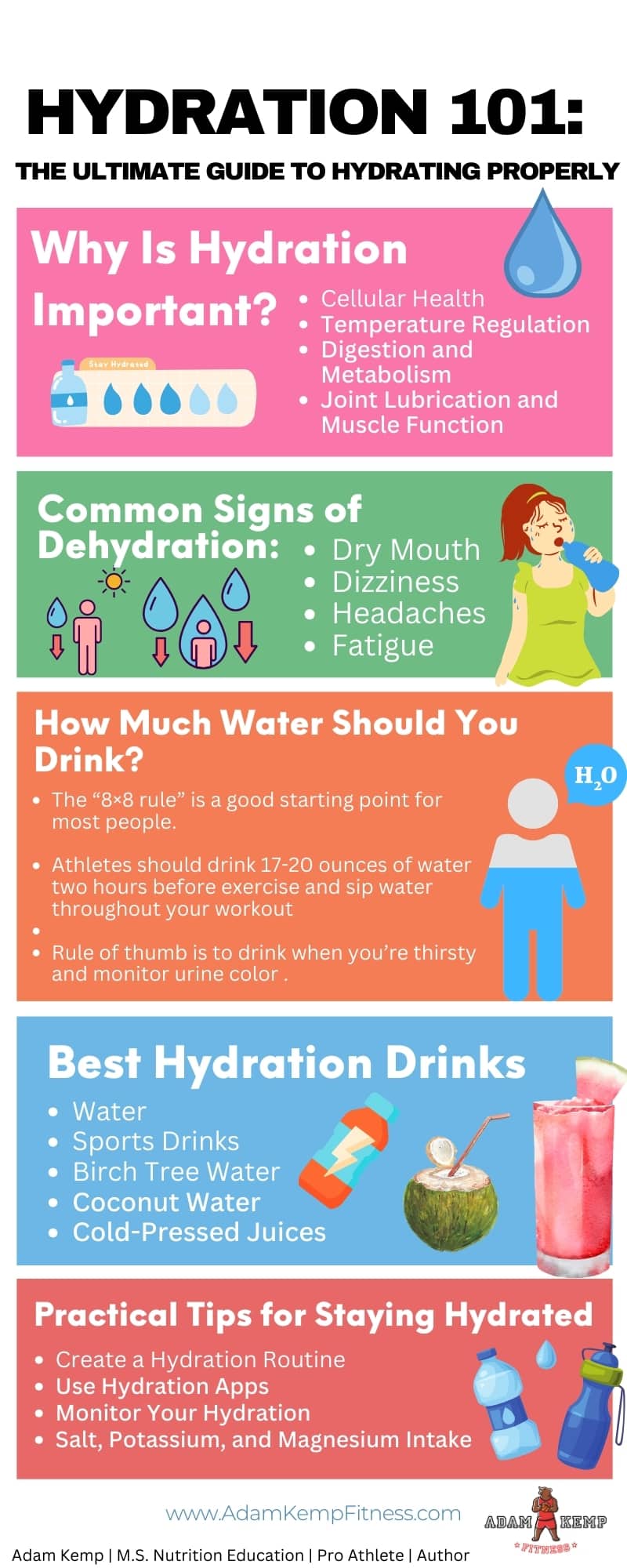
Effects of Dehydration
Dehydration occurs when fluid loss exceeds fluid intake, which is common during intense exercise. The consequences of dehydration for young athletes include:
- Performance Decline: Dehydration as low as 2% can reduce speed, agility, and strength.
- Health Risks: Lightheadedness, muscle cramps, and fatigue are common, but severe dehydration can lead to heat-related illnesses like heat stroke.
- Cognitive Impairment: Dehydration impairs focus, decision-making, and reaction time—essential components for success in sports.
Recognizing the Early Signs of Dehydration
Educating young athletes to identify dehydration symptoms can prevent complications during exercise. Common signs include:
- Headaches and lightheadedness
- Muscle cramping and weakness
- Fatigue and irritability
- Dark yellow urine
- Decreased ability to concentrate
These early warning signs should prompt immediate rehydration to avoid more severe issues such as exertional heat illness.
Risks of Overhydration
Overhydration, or hyponatremia, can occur when athletes drink excessive amounts of water, diluting sodium levels in the blood.
Symptoms range from nausea and headaches to more severe complications like seizures or even death.
Balancing hydration with appropriate electrolyte intake is crucial.
How Much Fluid Is Enough?
Fluid needs vary depending on body size, activity intensity, and environmental factors such as temperature and humidity.
A general guideline based on Dietary Reference Intakes (DRI) is:
- Boys 9-13 years: 2.4 liters/day (10 cups)
- Girls 9-13 years: 2.1 liters/day (9 cups)
- Boys 14-18 years: 3.3 liters/day (14 cups)
- Girls 14-18 years: 2.3 liters/day (10 cups)
However, active athletes often require additional fluids and electrolytes to replace sweat loss.
Calculating Sweat Loss for Personalized Hydration Plans
A practical approach to individualizing fluid intake is to calculate sweat loss during exercise.
Young athletes can calculate their sweat loss using this simple method:
- Pre-Exercise Weight: Weigh yourself in minimal or dry clothing before activity.
- Fluid Consumed: Track how much fluid you drink during the session.
- Post-Exercise Weight: Weigh yourself again in the same clothing after the session.
- Fluid Lost: Subtract post-exercise weight from pre-exercise weight.
- Fluid Replacement: Multiply pounds lost by three to determine how many cups of fluid to drink post-exercise.
For example, if an athlete loses 2 pounds during a practice, they should drink approximately 6 cups of fluid afterward to rehydrate adequately.
Special Hydration Considerations
Certain conditions increase the need for fluids, including:
- Hot or humid weather
- Wearing heavy equipment (e.g., pads)
- High-altitude environments
- Illnesses, especially with fever or gastrointestinal distress
In these cases, coaches and trainers should provide accessible fluids and schedule regular hydration breaks.
Best Hydration Drinks for Young Athletes
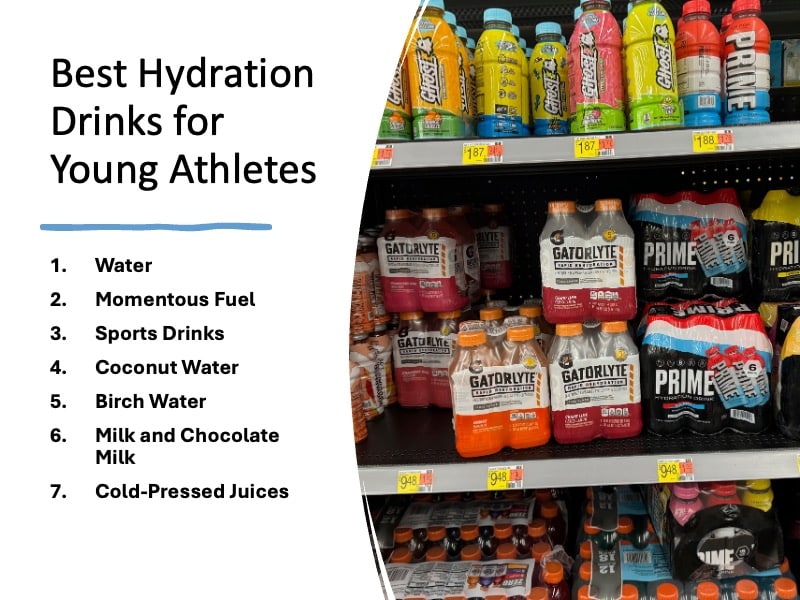
Choosing the right hydration drink is crucial for replenishing fluids, electrolytes, and nutrients lost during exercise.
While water is often sufficient for most activities, specific circumstances—such as prolonged workouts, intense training, or extreme weather—may call for alternatives. In my opinion, here are the best hydration drinks for young athletes:
1.) Water: The Gold Standard
Water is the simplest and most essential hydration drink.
It provides fluid without added sugars or calories, making it the best choice for everyday hydration and light physical activity.
Benefits:
- Regulates body temperature.
- Supports digestion and nutrient transport.
- Easily accessible and cost-effective.
When to Choose Water: Opt for plain water during short-duration or moderate-intensity activities. It’s also ideal for hydration throughout the school day and during non-athletic activities.
Pro Tip: If you sweat heavily during sports or workouts, consider adding 1/2 teaspoon of iodized salt to a glass of water daily. This simple addition helps replenish lost sodium, supports electrolyte balance, and ensures proper thyroid function through iodine intake.
2.) Momentous Fuel: A Premium Hydration and Energy Solution
Momentous Fuel is designed for athletes engaging in workouts or events lasting over 60 minutes. It provides a scientifically balanced combination of carbohydrates and electrolytes to support sustained energy, hydration, and peak performance.
Benefits:
- Balanced Energy: Features a 3:1 glucose-to-fructose ratio for enhanced carbohydrate absorption and steady energy without sugar crashes.
- Sustained Performance: Includes isomaltulose, a low-glycemic carbohydrate, for long-lasting energy release.
- Electrolyte Support: Replenishes sodium, magnesium, potassium, and zinc to maintain muscle function and hydration.
- Easy Digestion: The formula minimizes the risk of gastrointestinal distress during intense exercise.
When to Choose Momentous Fuel: Use during long workouts (60+ minutes), endurance sports, or high-intensity training sessions where hydration and energy maintenance are critical. It’s particularly effective for athletes in hot conditions or multi-hour events.
Pro Tip: Mix one scoop of Momentous Fuel in water and sip every hour during prolonged workouts to maintain hydration and energy levels without the risk of crashing or stomach discomfort.
Last update on 2025-07-08 / This article includes affiliate links/Images via Amazon Product Advertising API. I may earn commissions on purchases made through these links.
3.) Sports Drinks: Rehydration for Intense Exercise
Sports drinks like Gatorade Fit and Prime Hydration are designed to replenish electrolytes (sodium, potassium) and carbohydrates lost during long or high-intensity workouts.
Unlike traditional sports drinks, these newer options provide hydration with lower sugar and calorie content.
- Gatorade Fit: Contains essential electrolytes without added sugar or artificial ingredients, making it a healthier alternative for active athletes.
- Prime Hydration: I often recommend Prime Hydration for kids because it is made with coconut water as a base and offers a natural source of electrolytes with minimal sugar and added vitamins.
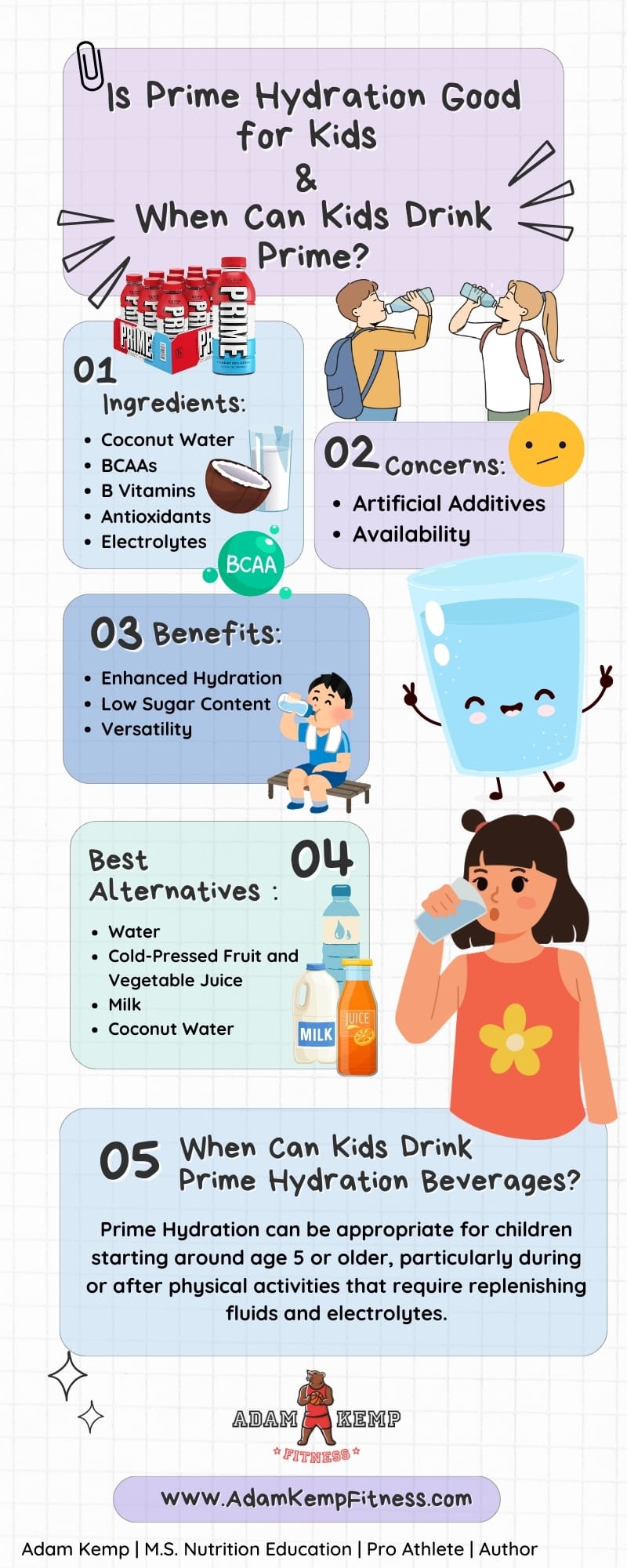
When to Choose Sports Drinks: Choose one of the best sports drinks during or after workouts lasting longer than an hour, especially in hot or humid environments or during back-to-back games or training sessions.
4.) Coconut Water: Nature’s Sports Drink
Coconut water is a natural hydration option packed with electrolytes, particularly potassium.
It’s a low-calorie, low-sugar alternative to commercial sports drinks.
- Benefits:
- Naturally rich in electrolytes (potassium, magnesium).
- Helps restore hydration after moderate to intense physical activity.
When to Choose Coconut Water: Ideal for post-workout hydration or as a lighter alternative to sports drinks. Avoid consuming large amounts, as excessive potassium intake can lead to an imbalance.
Pro Tip: Although coconut water for athletes is often promoted as a natural sports drink, its effectiveness depends heavily on timing and individual hydration needs. Avoid relying on coconut water for hydration during intense workouts or situations with excessive sweating. Its high potassium content can increase the risk of hyperkalemia, especially when significant sodium is lost through sweat. Opt for balanced electrolyte drinks instead.
5.) Birch Water: A Unique Natural Option
Birch water, such as TREO in the U.S., is an emerging hydration drink rich in magnesium and antioxidants. It offers hydration with added health benefits, including muscle support and recovery.
- Benefits:
- Contains magnesium to prevent muscle cramps.
- Low-calorie and naturally hydrating.
When to Choose Birch Water:
Perfect for athletes seeking a natural hydration drink with added nutrients for muscle function and energy production.
6.) Milk and Chocolate Milk: Hydration & Recovery Powerhouses
Milk is often overlooked as a hydration drink, yet it is incredibly effective due to its high water content and nutrient profile. With approximately 87% water, milk not only hydrates but also provides essential nutrients like protein, electrolytes, and zinc that support recovery and overall health.
Benefits:
- High Water Content: Milk’s water content is its most crucial aspect for hydration, helping replenish lost fluids effectively.
- Rich in Protein: Promotes muscle repair and growth after workouts.
- Electrolytes for Balance: Contains sodium, potassium, calcium, and magnesium to restore electrolyte balance and support hydration.
- Zinc for Recovery: Zinc in milk aids in immune function, muscle repair, and wound healing, making it an essential nutrient for athletes.
- Chocolate Milk’s Added Carbs: Provides carbohydrates to replenish glycogen stores, making it an excellent choice for post-workout recovery.
When to Choose Milk: Milk is ideal for post-workout recovery when athletes have time to digest it, especially after intense or prolonged exercise. It offers a hydrating and nutrient-dense option for those who tolerate lactose well.
Pro Tip: Due to its high water content and nutrient profile, milk is an excellent alternative to traditional sports drinks for rehydration and recovery after exercise, particularly when paired with a balanced meal. Avoid drinking milk before exercise, even if you tolerate lactose well.
7.) Cold-Pressed Juices: Nutrient-Packed Hydration
Cold-pressed juices are an excellent hydration option, combining the high water content of fruits and vegetables with essential vitamins, minerals, and antioxidants.
Unlike traditional juicing methods, cold-pressing preserves more nutrients by avoiding heat, making these juices a highly effective and refreshing way to hydrate and refuel after exercise.
Benefits:
- High Water Content: Ingredients like watermelon (92% water) and cucumber are extremely hydrating, making these juices excellent for fluid replenishment.
- Natural Nitrates (Beet Juice): Beet juice is rich in dietary nitrates, which are converted to nitric oxide in the body, enhancing blood flow and oxygen delivery to muscles. This can improve endurance and recovery.
- Lycopene and Citrulline (Watermelon Juice): Watermelon juice contains lycopene, a powerful antioxidant, and citrulline, which helps reduce muscle soreness and improve exercise recovery.
- Rich in Antioxidants: Both beet and watermelon juices reduce oxidative stress caused by intense exercise, aiding in quicker recovery.
- Electrolyte Support: These juices naturally contain potassium and magnesium, supporting muscle function and hydration balance.
When to Choose Cold-Pressed Juices: I suggest buying an affordable juicer and juicing once a day for post-exercise hydration, midday hydration boosts, or as part of a recovery meal. They’re especially beneficial after low-to-moderate intensity workouts or as a flavorful way to rehydrate during the day.
Pro Tip: Choose juices made from hydrating ingredients like watermelon and cucumber, and pair them with a protein source to enhance recovery and balance blood sugar levels. Avoid high-sugar commercial juices and opt for freshly made, minimally processed options for maximum nutritional benefits.
Drinks to Avoid
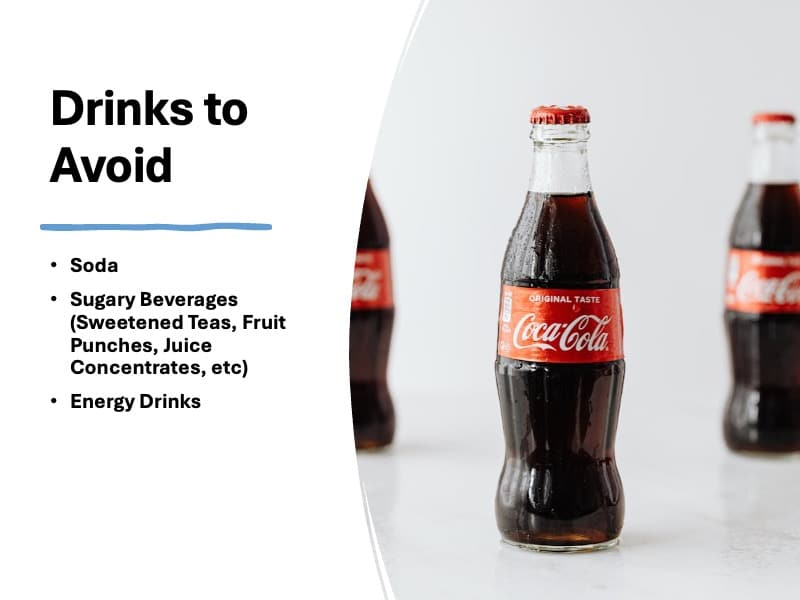
Soda and Sugary Beverages
Sugary drinks and sodas should be avoided by young athletes. They are high in calories, contain little to no electrolytes, and can increase dehydration.
- Why Avoid Them?
- Provide empty calories without performance benefits.
- High sugar content can lead to energy crashes.
1.) Soda: A Hydration Pitfall for Athletes
Soda is one of the least effective hydration options for young athletes. Its high sugar content and lack of electrolytes make it unsuitable for replenishing fluids lost during exercise.
Why Soda is Harmful:
- Empty Calories: Soda provides high calories with no nutritional value, contributing to weight gain without supporting athletic performance.
- Dehydration Risk: The caffeine and sugar in many sodas can act as diuretics, increasing fluid loss rather than replenishing hydration.
- Energy Crashes: Soda’s high sugar content causes a rapid spike in energy followed by a crash, negatively affecting focus and stamina.
Healthier Alternatives: Encourage water, low-sugar sports drinks, or natural hydration options like coconut water or milk to help young athletes establish habits that enhance their performance and health.
2.) Sugary Beverages: A Hidden Hydration Hazard
Drinks like sweetened teas, fruit punches, and flavored beverages are often marketed as healthy but are packed with added sugars that hinder hydration and recovery.
Why Sugary Beverages Should Be Avoided:
- Lack of Electrolytes: These drinks fail to replenish sodium, potassium, or other electrolytes lost through sweat.
- Blood Sugar Spikes: The high sugar content can disrupt blood sugar balance, leading to fatigue and decreased performance.
- Dental Health Concerns: Sugary drinks contribute to tooth decay, a significant concern for growing athletes.
Building Better Habits: Teach young athletes to read labels and recognize hidden sugars in beverages marketed as “natural” or “healthy.” Opt for water, cold-pressed juices, or low-sugar hydration drinks to provide both hydration and performance benefits.
3.) Energy Drinks: A Risky Choice for Young Athletes
Energy drinks are a popular but problematic choice among young athletes. Often marketed as performance enhancers, these beverages contain high levels of caffeine, sugar, and other stimulants that can negatively impact hydration, energy balance, and overall health.
Why Energy Drinks Are Harmful:
- High Caffeine Content: Energy drinks often contain excessive caffeine, which can lead to dehydration by increasing urine output. Caffeine also elevates heart rate and blood pressure, posing risks for young athletes.
- Sugar Overload: Many energy drinks are loaded with sugar, leading to rapid blood sugar spikes followed by energy crashes that impair performance and focus.
- Potential Health Risks: Stimulants and additives in energy drinks can cause jitters, anxiety, and sleep disturbances, all of which negatively impact recovery and athletic performance.
Performance and Hydration Impact:
- Dehydration: The combination of caffeine and sugar can exacerbate fluid loss, making energy drinks unsuitable for hydration during or after exercise.
- Impaired Recovery: High stimulant levels can interfere with sleep quality, which is essential for muscle recovery and overall athletic development.
Better Hydration Habits: Instead of energy drinks, encourage young athletes to rely on natural sources of energy like balanced meals, adequate sleep, and hydration with water or low-sugar electrolyte drinks. For an extra boost, cold-pressed juices or a piece of fruit paired with water can provide quick energy without the downsides of energy drinks.
Pro Tip: Teach athletes that energy drinks may feel like a quick fix but can harm long-term performance and health. Hydration-focused options like water, coconut water, or low-sugar sports drinks provide a safer, more effective alternative to fuel their energy needs.
This website does not provide medical advice. This website site does contain affiliate links, and purchases may earn a commission.
Read my Medical Disclaimer, Review Disclaimer, and Publishing Policies for more details. Use of this site indicates acceptance of these terms.

